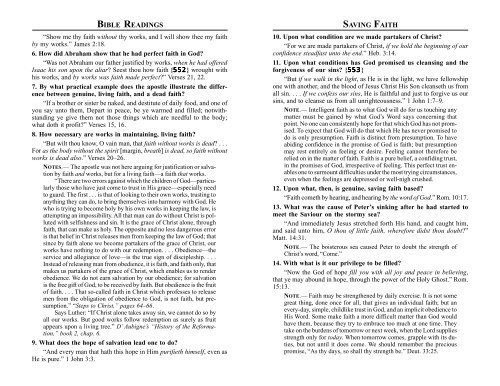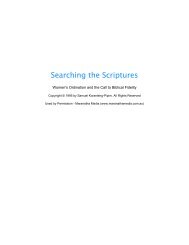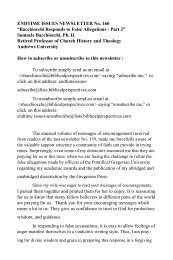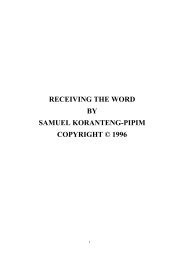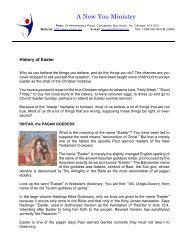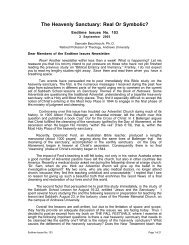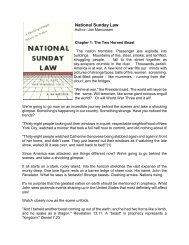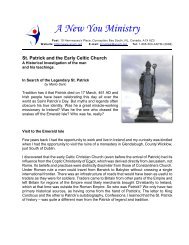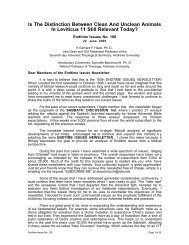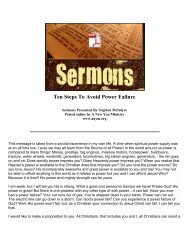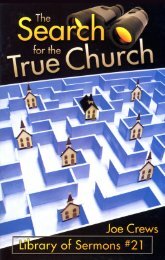Bible Readings for the Home Circleâ1914 - A New You Ministry
Bible Readings for the Home Circleâ1914 - A New You Ministry
Bible Readings for the Home Circleâ1914 - A New You Ministry
You also want an ePaper? Increase the reach of your titles
YUMPU automatically turns print PDFs into web optimized ePapers that Google loves.
BIBLE READINGS<br />
“Show me thy faith without thy works, and I will show <strong>the</strong>e my faith<br />
by my works.” James 2:18.<br />
6. How did Abraham show that he had perfect faith in God<br />
“Was not Abraham our fa<strong>the</strong>r justified by works, when he had offered<br />
Isaac his son upon <strong>the</strong> altar Seest thou how faith {552<br />
552} wrought with<br />
his works, and by works was faith made perfect” Verses 21, 22.<br />
7. By what practical example does <strong>the</strong> apostle illustrate <strong>the</strong> difference<br />
between genuine, living faith, and a dead faith<br />
“If a bro<strong>the</strong>r or sister be naked, and destitute of daily food, and one of<br />
you say unto <strong>the</strong>m, Depart in peace, be ye warmed and filled; notwithstanding<br />
ye give <strong>the</strong>m not those things which are needful to <strong>the</strong> body;<br />
what doth it profit” Verses 15, 16.<br />
8. How necessary are works in maintaining, living faith<br />
“But wilt thou know, O vain man, that faith without works is dead . . .<br />
For as <strong>the</strong> body without <strong>the</strong> spirit [margin, breath] is dead, so faith without<br />
works is dead also.” Verses 20–26.<br />
NOTES.— The apostle was not here arguing <strong>for</strong> justification or salvation<br />
by faith and works, but <strong>for</strong> a living faith—a faith that works.<br />
“There are two errors against which <strong>the</strong> children of God—particularly<br />
those who have just come to trust in His grace—especially need<br />
to guard. The first . . . is that of looking to <strong>the</strong>ir own works, trusting to<br />
anything <strong>the</strong>y can do, to bring <strong>the</strong>mselves into harmony with God. He<br />
who is trying to become holy by his own works in keeping <strong>the</strong> law, is<br />
attempting an impossibility. All that man can do without Christ is polluted<br />
with selfishness and sin. It is <strong>the</strong> grace of Christ alone, through<br />
faith, that can make us holy. The opposite and no less dangerous error<br />
is that belief in Christ releases men from keeping <strong>the</strong> law of God; that<br />
since by faith alone we become partakers of <strong>the</strong> grace of Christ, our<br />
works have nothing to do with our redemption. . . . Obedience—<strong>the</strong><br />
service and allegiance of love—is <strong>the</strong> true sign of discipleship. . . .<br />
Instead of releasing man from obedience, it is faith, and faith only, that<br />
makes us partakers of <strong>the</strong> grace of Christ, which enables us to render<br />
obedience. We do not earn salvation by our obedience; <strong>for</strong> salvation<br />
is <strong>the</strong> free gift of God, to be received by faith. But obedience is <strong>the</strong> fruit<br />
of faith. . . . That so-called faith in Christ which professes to release<br />
men from <strong>the</strong> obligation of obedience to God, is not faith, but presumption.”<br />
“Steps to Christ,” pages 64–66.<br />
Says Lu<strong>the</strong>r: “If Christ alone takes away sin, we cannot do so by<br />
all our works. But good works follow redemption as surely as fruit<br />
appears upon a living tree.” D’ Aubigne’s “History of <strong>the</strong> Re<strong>for</strong>mation,”<br />
book 2, chap. 6.<br />
9. What does <strong>the</strong> hope of salvation lead one to do<br />
“And every man that hath this hope in Him purifieth himself, even as<br />
He is pure.” 1 John 3:3.<br />
SAVING FAITH<br />
10. Upon what condition are we made partakers of Christ<br />
“For we are made partakers of Christ, if we hold <strong>the</strong> beginning of our<br />
confidence steadfast unto <strong>the</strong> end.” Heb. 3:14.<br />
11. Upon what conditions has God promised us cleansing and <strong>the</strong><br />
<strong>for</strong>giveness of our sins {553<br />
553}<br />
“But if we walk in <strong>the</strong> light, as He is in <strong>the</strong> light, we have fellowship<br />
one with ano<strong>the</strong>r, and <strong>the</strong> blood of Jesus Christ His Son cleanseth us from<br />
all sin. . . . If we confess our sins, He is faithful and just to <strong>for</strong>give us our<br />
sins, and to cleanse us from all unrighteousness.” 1 John 1:7–9.<br />
NOTE.— Intelligent faith as to what God will do <strong>for</strong> us touching any<br />
matter must be gained by what God’s Word says concerning that<br />
point. No one can consistently hope <strong>for</strong> that which God has not promised.<br />
To expect that God will do that which He has never promised to<br />
do is only presumption. Faith is distinct from presumption. To have<br />
abiding confidence in <strong>the</strong> promise of God is faith; but presumption<br />
may rest entirely on feeling or desire. Feeling cannot <strong>the</strong>re<strong>for</strong>e be<br />
relied on in <strong>the</strong> matter of faith. Faith is a pure belief, a confiding trust,<br />
in <strong>the</strong> promises of God, irrespective of feeling. This perfect trust enables<br />
one to surmount difficulties under <strong>the</strong> most trying circumstances,<br />
even when <strong>the</strong> feelings are depressed or well-nigh crushed.<br />
12. Upon what, <strong>the</strong>n, is genuine, saving faith based<br />
“Faith cometh by hearing, and hearing by <strong>the</strong> word of God.” Rom. 10:17.<br />
13. What was <strong>the</strong> cause of Peter’s sinking after he had started to<br />
meet <strong>the</strong> Saviour on <strong>the</strong> stormy sea<br />
“And immediately Jesus stretched <strong>for</strong>th His hand, and caught him,<br />
and said unto him, O thou of little faith, where<strong>for</strong>e didst thou doubt”<br />
Matt. 14:31.<br />
NOTE.— The boisterous sea caused Peter to doubt <strong>the</strong> strength of<br />
Christ’s word, “Come.”<br />
14. With what is it our privilege to be filled<br />
“Now <strong>the</strong> God of hope fill you with all joy and peace in believing,<br />
that ye may abound in hope, through <strong>the</strong> power of <strong>the</strong> Holy Ghost.” Rom.<br />
15:13.<br />
NOTE.— Faith may be streng<strong>the</strong>ned by daily exercise. It is not some<br />
great thing, done once <strong>for</strong> all, that gives an individual faith; but an<br />
every-day, simple, childlike trust in God, and an implicit obedience to<br />
His Word. Some make faith a more difficult matter than God would<br />
have <strong>the</strong>m, because <strong>the</strong>y try to embrace too much at one time. They<br />
take on <strong>the</strong> burdens of tomorrow or next week, when <strong>the</strong> Lord supplies<br />
strength only <strong>for</strong> today. When tomorrow comes, grapple with its duties,<br />
but not until it does come. We should remember <strong>the</strong> precious<br />
promise, “As thy days, so shall thy strength be.” Deut. 33:25.


